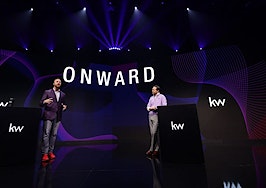We’ve got a full slate of digital and in-real-life events planned for 2021, for the best community in real estate. Up next: Connect Now on March 16. Save the dates, and register now!
When real estate broker Terrence Murphy was an athlete in high school and college and it came time for him to decide which coach to work with, one main question was: Who stayed in touch the most?
“That was a basic principle that I took from recruiting being an athlete to being in business and being a Realtor,” Murphy, broker and founder of TM5 Properties in Texas, told attendees at Inman’s Connect Now conference on Thursday.
“The statistic is 87 percent of Realtors don’t stay in touch with their clients after the transaction.”
Murphy, who played in the National Football League with the Green Bay Packers but became a broker after retiring with a neck injury, spoke in a session called “Engaging with Old Leads to Create New Business: An Inman Workshop.”
Christian Ross, managing broker at Engel & Völkers Atlanta was also on the panel, along with moderator Joe Rand, executive director for the Broker Public Portal. Joe Schutt, broker-owner of Unit Realty Group in Boston, also made a noteworthy cameo appearance.

Clockwise from top left: Joe Rand, Christian Ross, Joe Schutt and Terrence Murphy at Inman Connect Now on Feb. 18, 2021
Here are their tips for staying in touch with former clients:
1. Have a CRM
“My CRM is my lifeline,” Ross said. “I don’t care if it’s your Google Sheet. You have to make sure you’re notating this, that you’re putting updates in your calendar for birthdays. People love feeling acknowledged and feeling connected.”
She herself has tried out about a dozen CRMs, which she doesn’t recommend, but has landed on Follow Up Boss. Murphy uses Real Estate Webmasters, Brivity and Kunversion.
2. Develop a system of ‘touch points’
Ross sends handwritten notes after a listing appointment, when a home goes under contract and when a sale closes. When a former client refers her, she sends an Uber Eats gift card along with a note telling them to treat themselves to dinner.
“Follow up afterward to say that that person closed, what they’re doing, a picture of the house,” Ross said. “You have to love on all of your referrals.” She also sets up Google Alerts for the schools and companies her clients are associated with. “That way I can always relate back to a piece of news I found out from a Google Alert and use that as a touch point,” she said.
3. Don’t just celebrate the client once the deal is done
Murphy, who did 6,000 transaction sides in his first 10 years in the business, celebrates “wow moments” with clients throughout the transaction process. “When we sign a buyer’s rep or a listing agreement, that’s a wow moment,” Murphy said.
“So we don’t just say, ‘Hey, congrats. Thank you for the listing. It’ll go up.’ We actually send them a gift immediately.” Other such moments are when a home goes under contract, when the contingency period is over and when the appraisal comes in, he added.
4. Create systems that are scalable
Murphy’s firm uses a company called Tiff’s Treats to deliver warm, fresh-baked cookies to clients. The brokerage has an account with the company, and the company has the brokerage’s logo and business cards to send with the cookies.
“After we get a listing agreement, then they get it where it looks like it’s handwritten with our business card, and we can scale that because we just ordered it. [It] takes us 30 seconds, boom it’s out,” Murphy said. “So that’s just an example of creating a wow moment that you can scale.”
5. Make staying in touch with hundreds of clients fun
“I have no problem poking fun at myself in a nice way,” Ross said. “I will definitely make a GIF and send it or send someone else’s TikTok that I saw in another market,” she said. “I try to just incorporate fun things that I know people are looking at and then also just try to recreate it myself.”
She recently texted a video of herself fawning over a bathroom to 200 people. “The responses that I got back were were so funny,” she said. “It’s like they just know that I’m thinking of them and then the other leads there, they’re not as intimidated to think, ‘Oh, it’s real estate.’ I’m just like, ‘We’re gonna meet you where you’re at. Where are you at? That’s what I’m trying to find out.'”
6. Put people in different tiers depending on how much they engage
After a transaction closes, one person may never call you back while another refers you to all of their friends and buys several investment properties with you, Murphy noted. “It’s tough to treat [the latter] the same that I’m treating a buyer that bought from me three years ago and never responds to any of my email blasts,” Murphy said. “So we’ve created a system to keep people in those different cups based on referrals, transactions and communication.”
Those different groups then get different levels of attention — some people get texts, some get handwritten notes, some get gifts, some get FaceTime calls, some get in-person meetings.
7. Find ways to make a connection feel personal, even if it’s going out to a lot of people
Ross is known for her love of bathrooms and plays that up. Her first postcard of the year to her farm was a photo of herself in a bathtub, saying “We made it,” naming the charitable organizations her firm was able to give to in 2020, and asking for suggestions to add to the list in 2021. She ended with a soft sell: “Call me if you have any questions about the market.”
Murphy started a podcast six weeks ago, Real Estate Entrepreneur with Terrence Murphy, that has gotten people getting in touch with him after listening and asking to have lunch. “I’m not there physically talking to them every day, but they feel like they’re sitting in the office with me when I’m recording,” Murphy said.
8. Look back at how transactions went, and incorporate that into your system
“I always like to go back because I’m a football player,” Murphy said. “We will play the game, and then what do we do on Sunday? We watch the film and say, What did I do wrong? What did I do, right? So I’ll go back on my really good transactions and my bad transactions, and I get these little key metrics and things that I’m doing on each transaction. And then I turn it into a checklist and a system.”
That way, someone on his team can follow the same system and provide a similar experience to all clients.
“When you go into a Starbucks you get a similar customer experience, and that’s what we need to be thinking about as agents,” he said.
Ross advised agents to note down everything they do and create checklists. “Just understand that it’s not just a stop — this is a continuous process that you’re going to hone and make better,” she said.
9. Be who you are
Rand pointed out that Ross and Murphy weren’t sending out “prefabricated content” from a “content mill.” Rather, their content was recognizably about them. “That’s how you stay in touch with people,” Rand said.
“It’s that they feel that you’re speaking to them because they know you well enough to know that this is something that’s about you. Even though they may realize that you sent it to 300 people or 1,000 people, it’s about you. And that’s what I think is important about that: being authentic. Too many people … try to adopt a persona that’s not true to who they are, and that’s just not going to work. You got to be you.”
Murphy agreed. Realtors shouldn’t try to emulate successful peers, but rather learn from them, he said. “Truly be true to yourself because if you start chasing this vibe with some top agent in your market, and it’s not really you, people see through that, like quick,” Murphy said.
10. Use your values as a differentiator
One of Unit Realty Group’s core values is to be dog-friendly and the brokerage has incorporated this into marketing efforts. The brokerage recently ordered 75,000 poop bags and is going to start mailing them to dog owners across the city, Schutt told attendees.
“We are going to give them to the local charities that are dog groups, because they’re always looking for them,” he said. “We’re creating this whole thing around dogs. We just launched our new website; we’re still building out some of the dogs section. I bought the URL houseandhound.com.”
Schutt held up a poop bag that read “Unit Realty Group, Getting Sh*t Done … The Right Way,” prompting laughter from the other panelists.
“That’s what we were talking about with regard to being authentic,” Rand said. “That is his authentic self. It’s completely in line with what his branding is about. And that’s the point: Everybody’s got their thing. So you find your thing, and you share that.”





